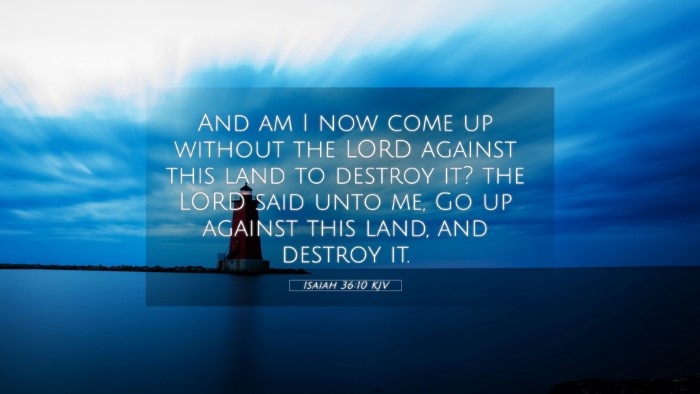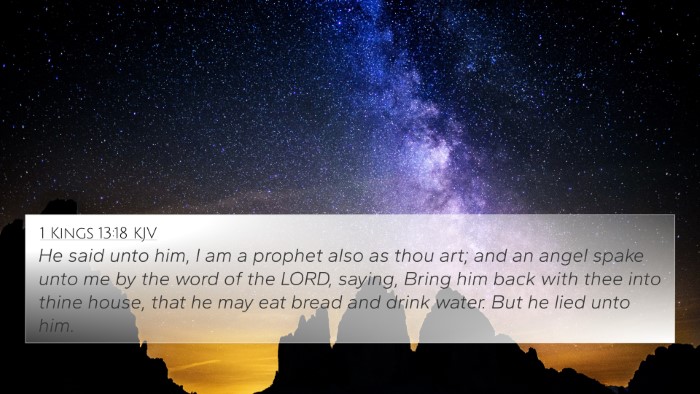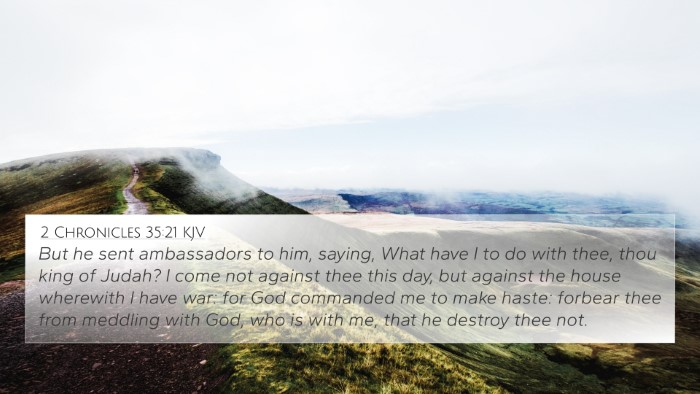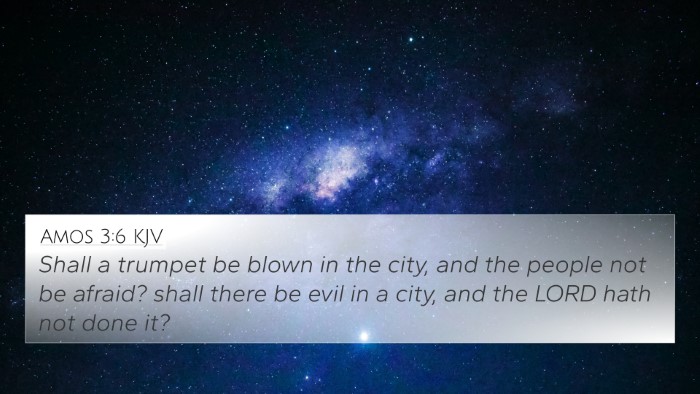Understanding Isaiah 36:10
Isaiah 36:10 states: "And am I now come up without the Lord against this land to destroy it? The Lord said unto me, Go up against this land, and destroy it." This verse occurs during the siege of Jerusalem by the Assyrian army under the command of Rabshakeh, who speaks to the people of Judah. The message he conveys carries significant implications, both in the historical context and in the theological interpretations that arise from it.
Contextual Background
The historical backdrop of Isaiah 36 marks a pivotal conflict where the Assyrians, known for their aggressive military campaigns, threatened the kingdom of Judah. Rabshakeh's address reflects not only a military tactic but also serves to undermine the faith of the people of Judah.
Interpretation and Commentary Insights
Matthew Henry notes that this verse illustrates the adversary's tactics of challenging the faith of God’s people, making them question God’s assistance in their hour of need. The Assyrian king's envoy is attempting to create doubt about God’s protection, which is a recurrent theme in the scriptures.
Albert Barnes provides further insight by indicating that Rabshakeh was sent by King Sennacherib with the divine permission to challenge Judah. This indicates how God can use even hostile forces to fulfill His purpose, which serves as a reminder that divine sovereignty governs all situations, even dire ones.
Adam Clarke elaborates that Rabshakeh's claim illustrates the boldness with which enemies may approach God’s people. It signifies the strength of the opposition as they make assertions of divine sanction, thus manipulating the truth to instill fear. Clarke warns that such distortions should lead believers to cling more tightly to their faith.
Thematic Connections
Isaiah 36:10 can be related to other scriptures that present themes of divine sovereignty, the challenges faced by God’s people, and the assurance of God’s presence. Here are several significant Bible cross-references to consider:
- 2 Kings 18:25 - A parallel account of the Assyrian invasion that reinforces the events described in Isaiah.
- Isaiah 37:6-7 - God’s assurance of deliverance amid threats.
- Psalms 56:11 - Affirmation of trusting God in times of fear.
- Jeremiah 32:17 - A celebration of God’s power over creation and circumstances.
- Romans 8:31 - A powerful reminder that if God is for us, none can stand against us.
- Isaiah 41:10 - Reassurance of God’s support amidst fear and uncertainty.
- Hebrews 13:5 - God's promise never to forsake His people.
Comparative Bible Verse Analysis
In comparing Isaiah 36:10 with other scriptures, we find a rich tapestry of themes related to faith, warfare, and divine assurance. This inter-Biblical dialogue reveals the consistency of God’s message throughout scripture, focusing on trust and reliance on God, especially during trials.
Tools for Bible Cross-Referencing
To dive deeper into scripture, tools for Bible cross-referencing include:
- Bible concordances
- Bible cross-reference guides
- Online Bible study tools
- Systematic cross-reference charts
Conclusions and Reflections
In summary, Isaiah 36:10 serves as a reminder of the challenges believers face against both physical and spiritual adversaries. The insights provided through Matthew Henry, Albert Barnes, and Adam Clarke encourage a deeper understanding of God’s sovereignty and the necessity of faith during tumultuous times. Cross-referencing this verse with others enhances our appreciation of the interconnectedness within scripture and the overarching narrative of God’s commitment to His people.
Through careful study and thoughtful reflection on verses such as Isaiah 36:10, we can gain clarity on how the Bible speaks to us across different contexts and eras. Let this be an invitation to engage thoughtfully with the Word of God, examining His character and promises that echo throughout the pages of scripture.








